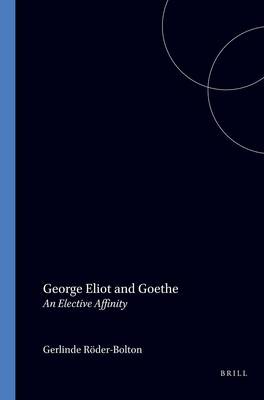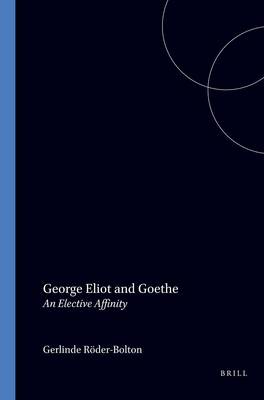
- Afhalen na 1 uur in een winkel met voorraad
- Gratis thuislevering in België vanaf € 30
- Ruim aanbod met 7 miljoen producten
- Afhalen na 1 uur in een winkel met voorraad
- Gratis thuislevering in België vanaf € 30
- Ruim aanbod met 7 miljoen producten
Zoeken
Omschrijving
In the first half of the nineteenth century in England there was a strong interest in German literature and German scholarship. George Eliot studied German and German literature from the age of twenty. Her first publication, in 1846, was a translation of Friedrich Strauss's Das Leben Jesu; followed, in 1854, by the translation of Ludwig Feuerbach's Das Wesen des Christentums. That same year George Eliot left England with George Henry Lewes on her first visit to Germany. During the next three months they visited Frankfurt, Weimar and Berlin to collect material for Lewes's biography of Goethe. In this study, Gerlinde Röder-Bolton explores the impact of Goethe on George Eliot, whose elective affinity with Goethe was both ethical and artistic, and analyses George Eliot's responsiveness to Goethe's moral vision and the literary uses she makes of her familiarity with Goethe's work. George Eliot and Goethe: An Elective Affinity concentrates on The Mill on the Floss and Daniel Deronda, showing how the intertextual relationship with Die Wahlverwandtschaften holds the key to an understanding of the latter part of The Mill on the Floss, while the first part of Faust and Wilhelm Meisters Lehrjahre throw new light on Daniel Deronda. This study, with its close analysis of a range of works by George Eliot and Goethe, is essential reading for anyone interested in both or either of these authors or in Anglo-German literary relations.
Specificaties
Betrokkenen
- Auteur(s):
- Uitgeverij:
Inhoud
- Aantal bladzijden:
- 292
- Taal:
- Engels
- Reeks:
- Reeksnummer:
- nr. 13
Eigenschappen
- Productcode (EAN):
- 9789042003590
- Verschijningsdatum:
- 1/01/1998
- Uitvoering:
- Paperback
- Formaat:
- Trade paperback (VS)
- Afmetingen:
- 150 mm x 220 mm
- Gewicht:
- 503 g

Alleen bij Standaard Boekhandel
+ 280 punten op je klantenkaart van Standaard Boekhandel
Beoordelingen
We publiceren alleen reviews die voldoen aan de voorwaarden voor reviews. Bekijk onze voorwaarden voor reviews.











